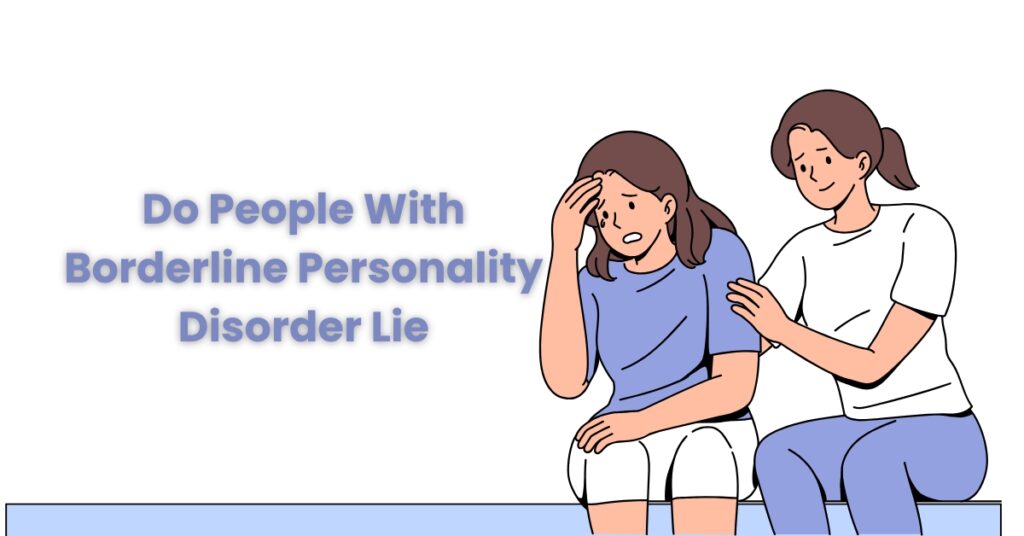Yes, people with Borderline Personality Disorder (BPD) can lie. Lying is often not due to malice, but rather a symptom of their condition.
Borderline Personality Disorder is a complex mental health issue. It impacts emotions, relationships, and self-image. People with BPD may lie to avoid abandonment, gain attention, or protect themselves from perceived threats. These lies can be impulsive and not premeditated. Understanding the reasons behind the lies can help in managing relationships with someone who has BPD.
It’s important to approach this topic with empathy and a desire to understand the underlying causes. This blog aims to shed light on why lying occurs and how to support those affected by BPD.
Topic of Contents
ToggleBorderline Personality Disorder Explained
Borderline Personality Disorder (BPD) is a mental health condition. It affects how individuals think and feel about themselves and others. People with BPD often struggle with intense emotions and unstable relationships. They may also have a distorted self-image and fear of abandonment.
Symptoms And Traits
Individuals with BPD exhibit a range of symptoms. Here are some common traits:
- Intense mood swings that can last a few hours to a few days.
- Fear of abandonment, real or imagined.
- Unstable relationships that swing between idealization and devaluation.
- Distorted self-image or sense of identity.
- Impulsive behaviors, such as spending sprees or binge eating.
- Self-harm or suicidal behaviors.
- Chronic feelings of emptiness.
- Intense anger or difficulty controlling anger.
- Paranoia or feeling disconnected from reality.
Causes And Risk Factors
The exact cause of BPD is unknown. Several factors may contribute to the development of the disorder:
- Genetics: BPD may run in families.
- Brain structure and function: There may be changes in brain areas related to emotion regulation.
- Environmental factors: Traumatic experiences, such as abuse or neglect, can increase the risk.
Risk factors for BPD include:
- Family history: Having a close family member with BPD.
- Childhood trauma: Experiencing abuse, neglect, or separation during childhood.
- Brain abnormalities: Differences in brain structure or function related to impulse control and emotional regulation.
Understanding BPD is essential for managing the condition. Awareness can lead to better support and treatment for those affected.
The Nature Of Lying
Lying is part of human behavior. Everyone lies at some point. Some lies are small and harmless. Others have bigger impacts. People with Borderline Personality Disorder (BPD) may lie for different reasons. Their lies can be complex and confusing. Understanding why they lie helps in understanding BPD better.
Types Of Lies
Lies can be big or small. They can be about important things or simple matters. White lies are common. These are small lies to avoid hurting someone’s feelings. Exaggerations are another type. People make things sound better or worse than they are. Some lies are more serious. These can be about big events or important facts. People with BPD may use all these types of lies.
Motivations Behind Lying
People with BPD lie for many reasons. Fear of abandonment is one. They lie to keep people close. They might also lie to avoid conflict. Some lie to get attention. They want to feel important. Others lie because they feel empty inside. The lies fill that void. Understanding these motives helps in dealing with BPD.
Lying And Mental Health
Lying can be a complex behavior. It is often linked to various mental health conditions. People with Borderline Personality Disorder (BPD) might lie for different reasons. Understanding these reasons requires exploring the psychological aspects and debunking common misconceptions.
Psychological Implications
People with BPD often experience intense emotions. These emotions can lead to impulsive actions. Lying might be one of these actions. It can serve as a way to cope with fear, insecurity, or rejection.
The inner turmoil of BPD can make truth-telling difficult. The person might not intend to lie. Instead, they might struggle with their perception of reality. This struggle can lead to confusion and miscommunication.
Common Misconceptions
There are many myths about BPD and lying. Some people think that those with BPD lie all the time. This is not true. Lying is not a defining trait of BPD. It is important to understand this distinction.
Another misconception is that people with BPD lie to manipulate others. This is a simplification. While lying might occur, it is often a reaction to emotional pain. It is not always a calculated act.
Table: Reasons for Lying in BPD
| Reason | Explanation |
|---|---|
| Fear of Rejection | Lying to avoid losing relationships. |
| Impulsivity | Quick, unplanned lies due to intense emotions. |
| Self-Protection | Protecting oneself from perceived threats. |
Understanding these reasons helps in empathizing with those affected. It is important to approach the topic with sensitivity and awareness. This way, we can better support those living with BPD.
Bpd And Honesty
Understanding the connection between Borderline Personality Disorder (BPD) and honesty can be challenging. People with BPD often face intense emotions and unpredictable mood swings. These symptoms can impact their honesty and trust in relationships.
Truth And Trust Issues
People with BPD often have a complicated relationship with the truth. Their intense fear of abandonment can lead them to distort reality. They might lie to avoid rejection or conflict. This behavior is not always intentional. It stems from their fear and emotional instability.
Trust issues are common in BPD. People with BPD might struggle to trust others. This mistrust can lead to a cycle of dishonesty. They might lie to protect themselves from perceived threats. This creates a barrier in their relationships.
Emotional Triggers
Emotional triggers play a significant role in the honesty of people with BPD. Intense emotions can cloud their judgment. They might say things they don’t mean. Or they might lie to escape an overwhelming situation.
Understanding these triggers is essential. It helps in managing their responses. Emotional regulation can reduce instances of dishonesty. Therapy and support from loved ones can help.
Why People With Bpd Might Lie
People with Borderline Personality Disorder (BPD) often face intense emotions. These emotions can lead to behaviors like lying. Understanding why this happens can help us show more compassion and support.
Fear Of Abandonment
Fear of abandonment is a major challenge for people with BPD. They might lie to avoid being left alone. This fear is deep and often irrational. For example, someone might lie about their feelings or actions to keep others close. They believe the truth might push people away. This fear drives them to say what they think others want to hear. They aim to secure their relationships, even if it means being dishonest.
Impulsive Behavior
Impulsive behavior is another reason people with BPD might lie. Their emotions can change quickly. This leads to impulsive actions, including lying. They might lie without thinking about the consequences. These lies can be small or big, but they often come from a place of emotional turmoil. The need for immediate relief or validation can override their judgment. This impulsivity can make their behavior unpredictable and confusing to others.
| Reason for Lying | Explanation |
|---|---|
| Fear of Abandonment | Lying to avoid being left alone. |
| Impulsive Behavior | Lying without thinking due to emotional changes. |
Understanding these reasons can foster empathy. People with BPD often struggle to control their emotions and actions. Recognizing the root causes of their behavior is the first step in providing the right support.
Identifying Lies In Bpd
Identifying lies in individuals with Borderline Personality Disorder (BPD) can be challenging. Their behavior often confuses those around them. Recognizing the signs and patterns can help. Understanding communication challenges also provides insight.
Signs And Patterns
People with BPD may show specific patterns when lying. They might tell inconsistent stories. Their mood swings can also signal dishonesty. Watch for dramatic changes in their narrative. They may exaggerate facts to gain sympathy. Sometimes, they might lie to avoid abandonment. Their lies often serve a self-protective purpose.
Communication Challenges
Communication with someone who has BPD can be difficult. They may misinterpret neutral comments. This can lead to defensive lying. Emotional intensity in conversations may cause them to distort the truth. They might struggle with expressing their feelings accurately. This can result in unintentional lies. Clear, calm communication can reduce misunderstandings.
Supporting Someone With Bpd
Supporting someone with Borderline Personality Disorder (BPD) can be challenging. It requires patience, understanding, and consistent effort. People with BPD often experience intense emotions and may struggle with trust and honesty. Here are some effective strategies to support a loved one with BPD.
Building Trust
Trust forms the foundation of any healthy relationship. For someone with BPD, trust is even more critical. They often fear abandonment and may be suspicious of others’ motives. To build trust:
- Be consistent: Keep your promises and be reliable.
- Show empathy: Listen to their feelings without judgment.
- Communicate openly: Share your thoughts and feelings honestly.
Encouraging Honesty
Encouraging honesty can help improve your relationship with someone with BPD. Honesty fosters a safe space for open communication. Here are some tips:
- Set a good example: Be truthful in your interactions.
- Provide reassurance: Let them know it is safe to be honest.
- Address issues calmly: Avoid reacting with anger or frustration.
Supporting someone with BPD requires time and effort. Building trust and encouraging honesty are key steps. These actions can strengthen your relationship and provide the support they need.
Therapies And Treatments
People with Borderline Personality Disorder (BPD) often struggle with intense emotions. These emotions can lead to behaviors such as lying. Effective therapy can help manage these behaviors. Below are some key therapies and treatments used for BPD.
Cognitive Behavioral Therapy
Cognitive Behavioral Therapy (CBT) is one of the most common treatments for BPD. CBT helps individuals identify negative thoughts. It also helps in changing these thoughts to positive ones. This process can reduce lying and other harmful behaviors.
Here are some methods used in CBT:
- Identifying triggers for negative thoughts
- Developing new, healthier thought patterns
- Setting realistic goals
- Practicing relaxation techniques
CBT focuses on the present. It aims to improve current behaviors and thoughts. Many people find CBT helpful in managing BPD symptoms.
Dialectical Behavior Therapy
Dialectical Behavior Therapy (DBT) is another effective treatment for BPD. DBT teaches skills to manage emotions and improve relationships. It also helps reduce harmful behaviors like lying.
DBT includes four main components:
- Mindfulness: Being present in the moment
- Distress Tolerance: Handling stressful situations
- Emotion Regulation: Managing intense emotions
- Interpersonal Effectiveness: Improving communication skills
DBT is structured and involves both individual and group sessions. It provides a supportive environment for learning and practicing new skills. Many find DBT to be life-changing in managing BPD.
| Therapy | Focus Area | Methods |
|---|---|---|
| CBT | Changing negative thought patterns | Identifying triggers, setting goals, relaxation techniques |
| DBT | Emotion and behavior management | Mindfulness, distress tolerance, emotion regulation |
Both CBT and DBT offer valuable tools for managing BPD. They help reduce harmful behaviors, including lying. Therapy can lead to a healthier and more fulfilling life.
Frequently Asked Questions
Do People With Bpd Lie More Often?
People with BPD may lie due to fear, shame, or impulsivity. It’s not intentional.
Can Lying Be A Symptom Of Bpd?
Yes, lying can be a symptom of BPD. It often stems from emotional distress.
How Does Lying Affect Relationships With Bpd?
Lying can damage trust in relationships. It creates misunderstandings and conflicts.
How To Support Someone With Bpd Who Lies?
Show empathy and understanding. Encourage honest communication. Seek professional help if needed.
Conclusion
Understanding BPD and its complexities helps reduce stigma. People with BPD may lie sometimes, but it’s not always intentional. They need compassion, not judgment. Educate yourself and support those with BPD. Knowledge fosters empathy and better relationships.







